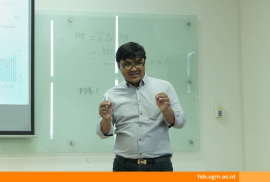On Wednesday and Thursday, June 26 until 27 2019, 15 delegates from Singapore’s Lee Kong Chian School of Business, Singapore Management University (SMU LKCBS) headed by Prof. Tan Chin Tiong, Senior Advisor to President and Prof. Gerry George, Dean of SMU LKCBS conducted a series of activities aimed to strengthen academic cooperation between the two parties. The visit was also intended as a brainstorming for further academic activities which are expected to be more impactful to the community, as stated by the Dean of FEB UGM, Dr. Eko Suwardi when opening the event while giving a welcome speech. The two day visit consisted of seminars with the theme of The Latest Indonesian Economics and Development and industry visits. The seminar be held for two hours and presented by three lecturers of FEB UGM, that is Singgih Wijayana, Ph.D (Department of Accounting), Boyke R. Purnomo, Ph.D., CFP. (Department of Management), and Sekar Utami Setiastuti, Ph.D. (Department of Economics).
The first session was the presentation of discussions on the latest developments of IFRS adoption in Indonesia by Singgih Wijayana, Ph.D. Singgih explained that the IFRS financial report started with the global economic crisis that took place in 2008 to 2009. With the aim of promoting stability in international finance, leaders of the G20 countries met regularly to discuss policies to strengthen the global economy and improve financial regulation. In addition, high-quality IFRS financial statements are considered to be able to encourage cross-border capital flows, increase capital market efficiency, and reduce capital costs. The challenges that arise as a result of implementing IFRS today are mainly language, the costs of preparation, implementation, and economic responsibility. Singgih gave an example the implementation of telecommunication tower companies. According to him, five companies are 82% market share telecommunication tower business in Indonesia is publicly listed. They recognize telecommunication tower as an investment property(PSAK13 / IAS40), while the remaining companies or 18% telecommunication tower business are owned by small companies and not publicly listed. They recognize telecommunication tower as Property, Plant, and Equipment (PSAK 16 / IAS16).
The event continued with the presentation of the material entitled “The Indonesian Creative Economy: development, dynamics, and challenges” by Boyke R. Purnomo, PhD., CFP. Boyke said that currently even though the classification and policy initiative are set-up by the central government, implementation at the local levels is made differently. Its because some local governments interpret the creative industry as a culture-based economy and focus on cultural preservation, such like Yogyakarta and Surakarta city, while other cities interpret the creative industry as a knowledge and technology-based economic sector and focus on innovation and knowledge learning, such as Bandung and Cimahi. At present, there are 16 potential sub-sectors to be mobilized. Of all these sectors that have grown to the export market significantly are the sub-sectors in culinary, fashion, and craft. Boyke said, there was three approaches taken to overcome the differences in these interpretations. Firstly, a top-down approach, has been implemented particularly by the influence of national and provincial initiatives via “creative city pilot projects” such like Yogyakarta and “city branding strategy” or in Cimahi. Secondly, a bottom-up approach, which has been implemented in Bandung, where creative communities play more active roles in initiating and developing these industries through events and festivals. The last one is a mixed approach, Boyke took the example in Surakarta City, collaboration has been done well through government assistance programs or initiatives from the community. He also explain there are five factors Indonesia’s challenge in facing the creative economy. The first one is unequal developments within the entire sub-sector, unequal developments within provinces, finance and capital access, market penetration to overseas market, law enforcement of IPRs for creative players, and relatively low level of education.
The second day, on Thursday(27/06) activity continued with an industrial visit. The first company to visit was Otazen, a Foreign Investment Company (PMA) engaged in the export furniture industry located in Klaten. The visit was received directly by the owner of Otazen, Mr. David Casademon. Questions about business strategy, location selection, operations, and human resources came to the fore and became a discussion that lived for approximately 1.5 hours. The presentation from Otazen continued with factory touring. The same question was conveyed when the delegation had the opportunity to visit Bucini, an export quality leather processing industry located in Berbah. The last company visited was PT Aino. This subsidiary of PT Gama Multi Usaha Mandiri (GMUM) was the choice to visit because of the different forms of the industry with the two previous companies in addition to the tendency of start-up businesses that were rising in recent years. The delegation was interested in the material presented by a representative from PT Aino, which was mostly millennial, so discussions especially related to the strategies used by PT Aino to be able to compete with similar start-ups became an interesting discussion. Delegates were also given the opportunity to see business processes directly and several prototypes developed by PT Aino.
Source: Sony Budiarso/OIA FEB UGM




